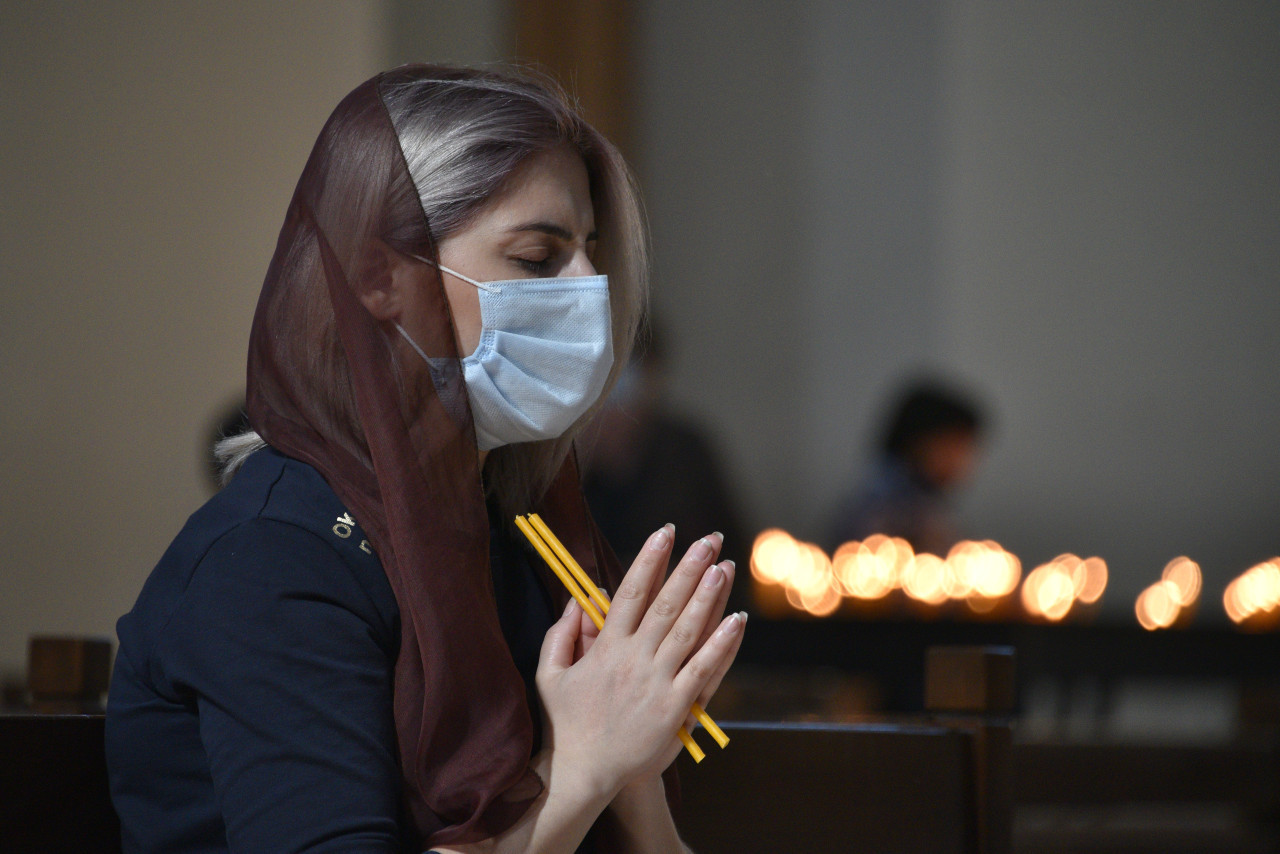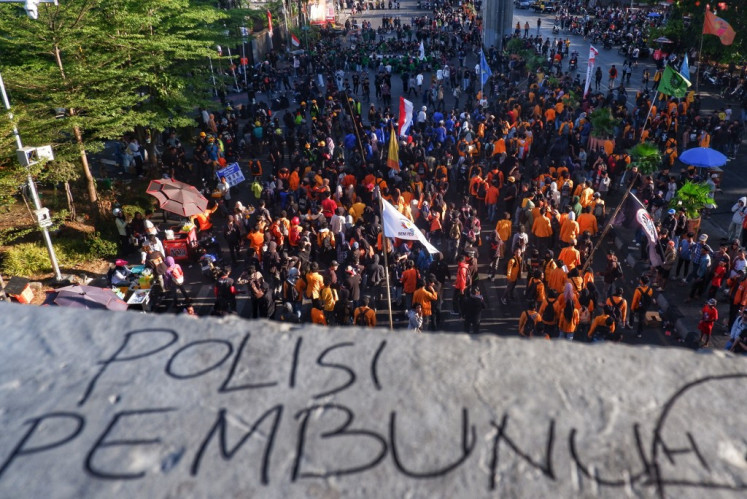Popular Reads
Top Results
Can't find what you're looking for?
View all search resultsPopular Reads
Top Results
Can't find what you're looking for?
View all search resultsArmenia accuses Azerbaijan of violating humanitarian truce
Saturday's ceasefire followed a major escalation that saw a missile strike kill 13 people including small children in the Azerbaijani city of Ganja, for which President Ilham Aliyev vowed to take "revenge".
Change text size
Gift Premium Articles
to Anyone
 An Armenian woman, wearing a face mask, prays in a church in Yerevan on Saturday, for Armenians killed during fighting over the breakaway region of Nagorno-Karabakh.
Baku and Yerevan have for decades been locked in a simmering conflict over Nagorno-Karabakh, an ethnically Armenian region of Azerbaijan which broke away from Baku in a 1990s war that claimed the lives of some 30,000 people.
The Caucasus neighbors have defied international calls to halt hostilities and accused the other of starting new clashes that began Sept, 27 and have seen the heaviest fighting since a 1994 truce.
(AFP/Karen Minasyan)
An Armenian woman, wearing a face mask, prays in a church in Yerevan on Saturday, for Armenians killed during fighting over the breakaway region of Nagorno-Karabakh.
Baku and Yerevan have for decades been locked in a simmering conflict over Nagorno-Karabakh, an ethnically Armenian region of Azerbaijan which broke away from Baku in a 1990s war that claimed the lives of some 30,000 people.
The Caucasus neighbors have defied international calls to halt hostilities and accused the other of starting new clashes that began Sept, 27 and have seen the heaviest fighting since a 1994 truce.
(AFP/Karen Minasyan)
A
rmenia on Sunday accused Azerbaijan of violating a fresh humanitarian truce aimed at halting weeks of fighting over the Nagorno-Karabakh region that has claimed hundreds of lives.
Yerevan's defense ministry spokeswoman Shushan Stepanyan said on Twitter that Azerbaijan had fired artillery shells and rockets in the early hours of Sunday, just minutes after the ceasefire went into effect from midnight (2000 GMT).
There was no immediate reaction from Azerbaijan.
Saturday's ceasefire followed a major escalation that saw a missile strike kill 13 people including small children in the Azerbaijani city of Ganja, for which President Ilham Aliyev vowed to take "revenge".
A previous truce brokered by Russia to allow the warring sides to exchange prisoners and bodies and begin "substantive" talks quickly broke down, with both sides accused each other of violations.
Azerbaijan and the Armenian separatists who control its Karabakh region have been locked in a bitter impasse over the fate of the mountainous province since a war in the 1990s that left 30,000 people dead.
Clashes erupted again three weeks ago and have killed at least 700 people, threatened to draw in regional powers Russia and Turkey, and raised alarm over the failure of a decades-long international mediation.
The real death toll is probably much higher since Azerbaijan has not published fatalities among its soldiers.
With neither side making decisive gains - and a smokescreen of claims and counter-claims of victory blurring events on the frontline - there is no telling when the fighting will end.
The latest ceasefire came after Azerbaijan's President Ilham Aliyev vowed to take revenge on Armenia after a missile strike killed 13 people including small children in the city of Ganja.
The early hours attack, which also saw a strike on the nearby strategic city of Mingecevir, came hours after Azerbaijani forces shelled Stepanakert, the capital of the ethnic Armenian separatist region.
The explosions in Ganja leveled a row of houses and left more than 45 people injured in an attack Aliyev described as "a war crime".
He said his army would "take revenge on the battlefield" and promised to capture Karabakh by driving out Armenian forces "like dogs".
Prosecutors said that as the result of the attack on Ganja 13 people died including small children.
An AFP team in Ganja saw rows of houses turned to rubble by the strike, which shattered walls and ripped roofs off buildings in the surrounding streets.
"We were sleeping and suddenly we heard the blast. The door, glass, everything shattered over us," said Durdana Mammadova, 69, who was standing on the street at daybreak because her house was destroyed.
Nagorno-Karabakh's military said for its part that Azerbaijani forces had stepped up their attacks on Friday across the front, shelling Stepanakert and a nearby town.
On Saturday, Karabakh separatist leader Arayik Harutyunyan had said before the truce took effect that "intensive fighting" continued "along the entire line of defence".
The EU on Saturday condemned the strikes on Ganja and said the original ceasefire deal "must be fully respected without delay".
"All targeting of civilians and civilian installations by either party must stop," said a spokesperson for EU foreign affairs chief Josep Borrell.
Turkey, a staunch ally of Azerbaijan and widely accused of supplying mercenaries to bolster Baku's forces, said the strikes were a war crime and called on the international community to denounce them.
Nagorno-Karabakh, a breakaway region of Azerbaijan mainly inhabited by ethnic Armenians and backed by Yerevan, has been the scene of deadly clashes since Sept.27.
It has remained under separatist Armenian control since a 1994 ceasefire ended the post-Soviet conflict.









